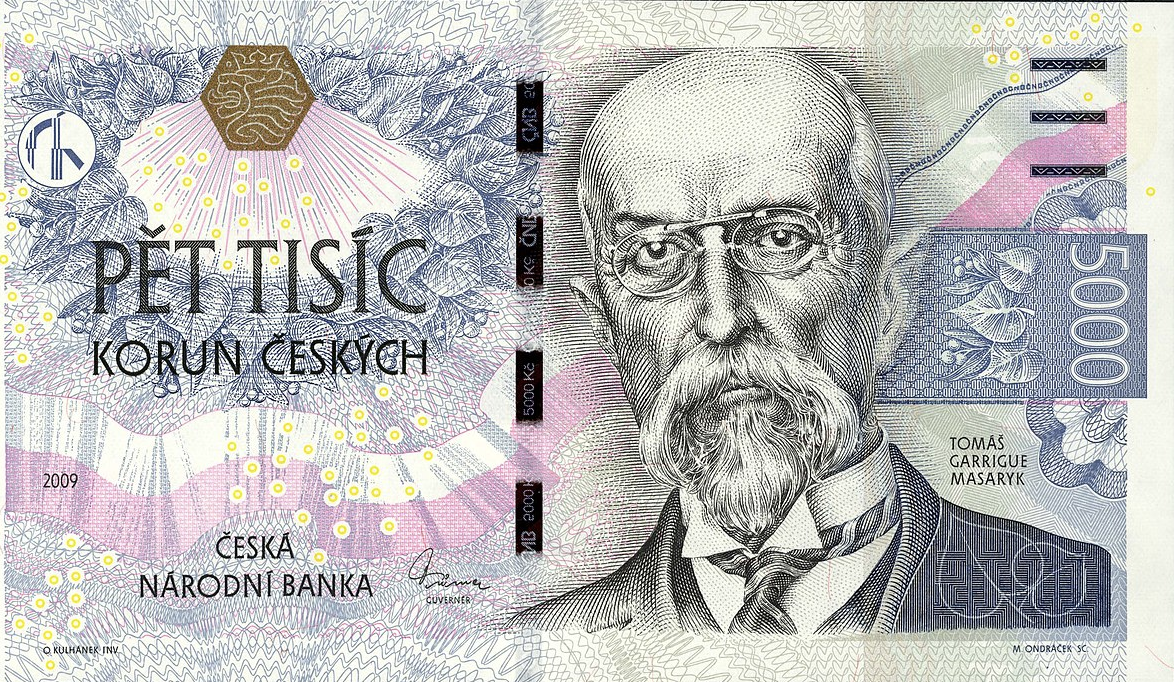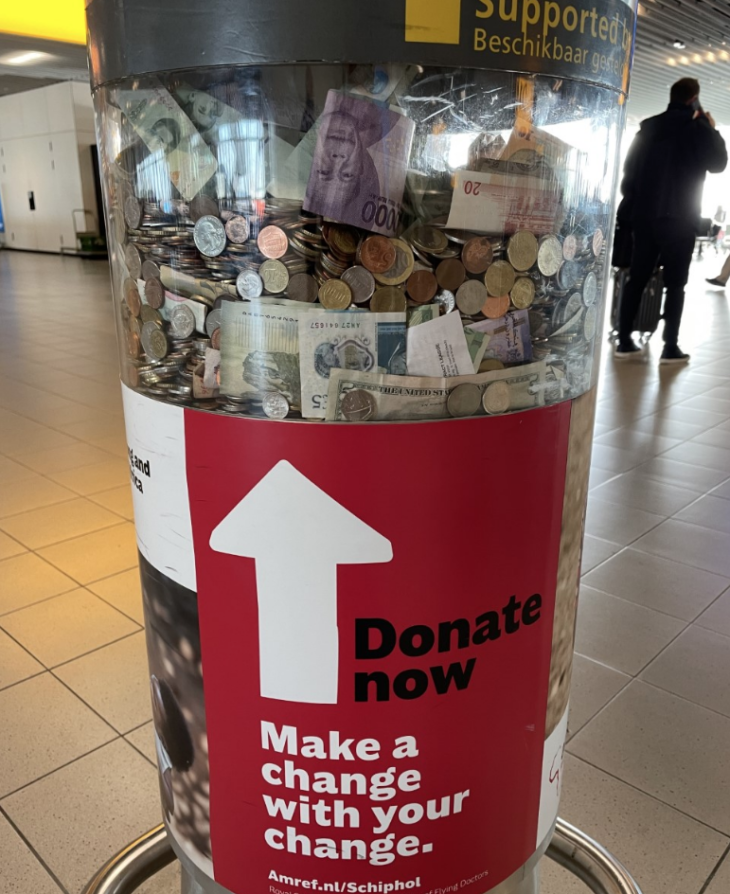
I recently left Czechia, and I’ll probably never return to that country. (Not because it’s not worth revisiting, but I have many other places that I’d like to visit and limited time to do so.)
Perhaps you’ve had the same experience. You are at the train station or airport with a bit of local cash that will be useless at your next stop. Too little to exchange. What should you do with it?
I’ve seen airports with a bin where extra cash can be deposited. They say it will go to charity. Alternatively, you could burn the currency note. What should a utilitarian do? Here’s how I think about the issue:
1. Assume that it costs 5 cents to manufacture one dollar’s worth of Czech currency. Then burning currency notes is like donating 95 cents on the dollar to the Czech government. It provides them with “seignorage”.
2. If I believe that donating 95 cents to the Czech government will have more positive effects than donating $1 to a charity I know nothing about, then I should burn the currency, and vice versa.
If this result seems odd, it’s because we are used to thinking about currency as net wealth. Burning money seems grotesquely wasteful. The currency stock as a whole is net wealth, as it provides useful transactions services to society. But burning one currency unit doesn’t significantly reduce that value of the total currency stock, as it would be almost costlessly replaced by the Czech government. The only waste involved is the cost of printing a unit of new currency.
If you suspect that the quantity theory of money is lurking somewhere in the background, you are correct. But only in a ceteris paribus sense. In the long run, boosting the money supply by X% will reduce the purchasing power of each unit of money by the same proportion, other things equal.
PS. I can’t get used to all of these name changes. First Bohemia, then Czechoslovakia, then Czech Republic, and now Czechia. When will they settle on a name? (Yes, I know–they don’t all cover exactly the same region.)
PPS. Because we also spent two weeks in Austria, I have a few thoughts on why Vienna has once again topped the rankings of the most livable cities in the world.
I suspect that the break-up of the Austro-Hungarian Empire in 1918 indirectly caused Vienna to become a very nice city today. By the early 20th century, Vienna had rapidly expanded into a city of roughly 2 million, presiding over a large empire. Buildings constructed during the decades leading up to WWI had a lot of character—Vienna has “good bones”.
If the empire had survived, Vienna would have expanded greatly during the 20th century, adding lots of ugly utilitarian architecture, such a public housing projects. But for a small country such as Austria, a capital city with 2 million people is plenty large, and hence Vienna has roughly the same population as it had 100 years ago. As Austria has become richer after WWII, the city expanded to fill out the older city, much like a boy grows into his older brother’s clothing. It didn’t have to add as many ugly buildings as Paris and London, and also avoided some of their congestion.
Modern Vienna is thus preserved in amber to a greater extent than most other European capitals. In most cases, being stagnant is a sign of poverty. But Austria is a relatively rich country, without its capital city being very dynamic. Perhaps it is that combination that explains Vienna’s high ranking.
PPPS. I took this picture in Amsterdam:


READER COMMENTS
robc
Oct 19 2022 at 4:25pm
Take the money home as a souvenir. Provides the same seignorage as burning it does, but you have something of value also. And if you ever want to, or happen to go back, you can convert it back from a souvenir to cash and reduce the seignorage.
Scott Sumner
Oct 19 2022 at 6:44pm
Good observation.
Dylan
Oct 20 2022 at 8:02am
Or if you have a friend or relative going there, a little bit of cash can make a nice present.
I’ve never been to Vienna, but when I was in Prague a couple of years ago I met a number of backpackers that were coming from there, and no one liked it. And, I think that lack of dynamism captures it. The relatively young people found it expensive, but also kind of boring compared to Budapest or Bratislava, the other places they had been on their travels. Bratislava I heard was pretty ugly, full of that dull utilitarian architecture that you mention, but at the same time, had a feeling of more energy compared to Vienna.
Scott Sumner
Oct 20 2022 at 12:32pm
Yes, conservative bourgeois prosperity isn’t of much appeal to young people.
Aleksander
Oct 20 2022 at 9:08am
You might also want to consider when you want the money to be available for use to other people. Unless you burn the money in public, the Czech monetary authorities won’t know the money is out of circulation yet, only that you didn’t spend them that day. If you donated them directly to the Czech government, they would be available to them immediately.
Scott Sumner
Oct 20 2022 at 12:31pm
It happens automatically when a central bank is targeting something like interest rates or exchange rates.
Steven Kopits
Oct 20 2022 at 12:15pm
I prefer Budapest to Vienna.
JoeMac
Oct 20 2022 at 2:39pm
Wasn’t Vienna basically run by communists during the 1920s?
https://en.m.wikipedia.org/wiki/Red_Vienna
Matt
Oct 20 2022 at 4:35pm
See also this book:
https://www.amazon.com/Architecture-Red-Vienna-1919-1934/dp/0262024519/ref=mp_s_a_1_1?crid=ESRVSXCO2D9P&keywords=blau+architecture+red+vienna&qid=1666297945&qu=eyJxc2MiOiIwLjg0IiwicXNhIjoiMC4wMCIsInFzcCI6IjAuMDAifQ%3D%3D&sprefix=blau+architecture+red+vienna%2Caps%2C207&sr=8-1
Joe Rini
Oct 20 2022 at 4:38pm
Interestingly the population of Berlin 100 years ago was also roughly the same as today (3.8 million).
Of course Berlin looks nothing like an amber preserved beauty; but there are historical reasons for that.
Kevin
Oct 20 2022 at 8:42pm
You can also just drop the cash in a nearby tip jar, if you believe giving a bit of money to a randomly chosen worker is more valuable than either the government or whatever charity spends money on airport outreach. I don’t know if European airports and train stations tend to have tip jars though….
Matthias
Oct 22 2022 at 2:31am
You can also drop the money on the ground, in that case.
Martin Sustrik
Oct 20 2022 at 11:57pm
Big city in a shrinking country – that applies to Budapest as well and it surely explains its charm. But Budapest haven’t made it to the list of most livable cities. Why? And what about London after the collapse of the British Empire. Moscow after disintegration of USSR?
Phil
Oct 21 2022 at 9:14am
How about just walking up to someone who is leaving the airport, stopping them and say, “I am leaving the country, and I have extra currency that will be of no use to me. I hope that you can find a good use for it.” Getting an unexpected gift like that likely gives a utility bounce to the recipient that exceeds the utility generated by just the cash.
Jack
Oct 22 2022 at 4:59am
For what it’s worth, as a Czech person I’m sick of the name changes too. They only apply to English – the short name in Czech and most other European languages is stable (Česko, Tschechien, Tchéquie, etc.).
Bohemia is a beautiful name which was historically used for the whole country, but very serious Czech academics with many academic titles and faux-wood paneled offices nestled deep within impersonal concrete towers incorrectly insist it can only be used for Bohemia proper, so we’re stuck with the monstrous ‘Czechia’.
A small aside, but Czech monetary policy in the interbellum is worth reading about for anyone with an interest in that time period. The Czechoslovak crown was virtually the only currency to succeed the Austro-Hungarian crown and not suffer from hyperinflation, due to stalwart economic management.
Oscar
Oct 30 2022 at 4:48pm
I believe it’s called Czech Republic nowadays. Better than Czechia anyhow….
Comments are closed.